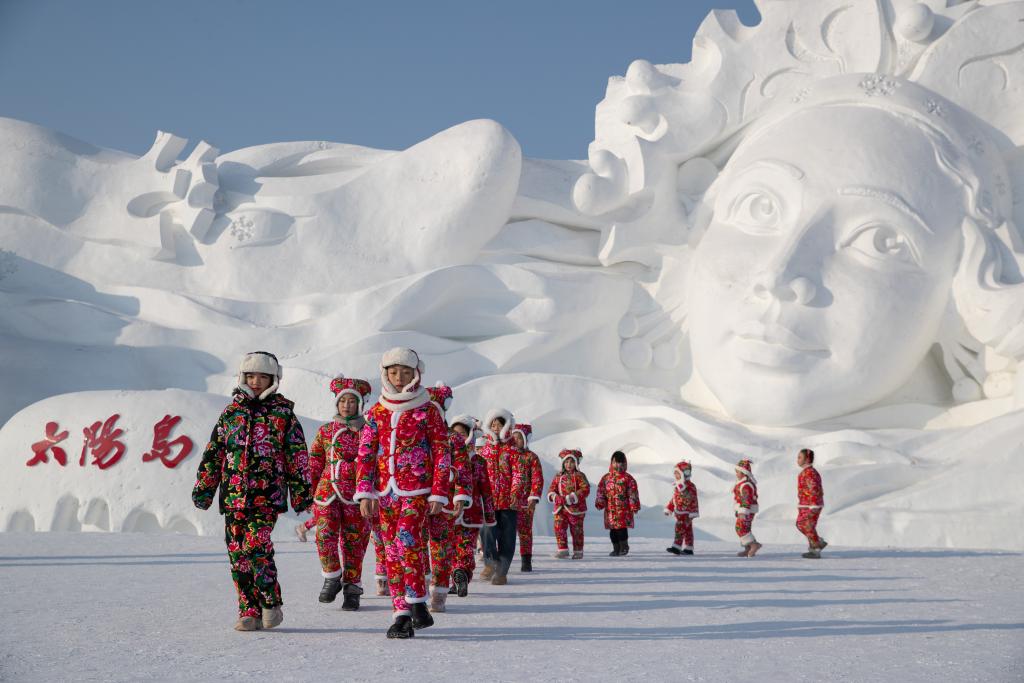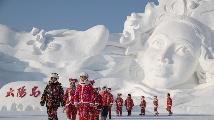HARBIN, Jan. 29 (Xinhua) -- Seeing fish moving in mile-long nets dragged out of the frozen Jingpo Lake, Katarzyna Wilkowiecka gasped with surprise and joined the Chinese tourists around her in taking pictures.
"This is remarkable," she said, adding that it's clear why numerous travelers from the southern provinces of China are eager to visit this place.
As the minister-counselor and head of the economic section of the Embassy of Poland in China, Wilkowiecka visited northeast China's Heilongjiang Province along with 21 other envoys, diplomats, and representatives from 18 countries and international organizations from Jan. 23 to 27, to have a closer look at some of the top winter tourism attractions and venues for the upcoming Asian Winter Games.
Wilkowiecka, like other diplomats, was impressed by the scenery, services, and infrastructure on offer in the northernmost province, feeling the vitality and potential of ice-and-snow tourism in Heilongjiang.
Overlooking the silver-coated huts and hills in Snow Town, in the city of Mudanjiang, Peter Lizak, the Slovak Ambassador to China, expressed his enjoyment of the view.
"I congratulate you on building this nice Snow Town, and the atmosphere here reminds me of the many snowy villages in my country," said Lizak.
Lizak first came to China in 2022 and has visited many cities since then. "Last week I went to Guangzhou where the temperature was 25 degrees Celsius, and here it is minus 25 degrees. Such a big difference!" he said.
Impressed by the frozen vistas of Snow Town, Lizak added that he could see the growing momentum of winter tourism in northeast China.

Children perform during a costume parade at the Sun Island scenic spot in Harbin, northeast China's Heilongjiang Province, Jan. 28, 2024. (Xinhua/Zhang Tao)
"I would love to invite my friends and family to northeast China in winter and visit these resorts, as their conditions are of high level," he said.
Lizak said there are hundreds of snowy villages and resorts in European countries like Slovakia and Austria, adding he's more than willing to share the experience gained in Europe with China to promote the development of more such winter resorts in China.
Apart from the attractive landscape and impressive services, Lizak and his diplomat colleagues were also amazed by the development of winter sports fueled by booming ice-and-snow tourism.
After skiing at the region's renowned Yabuli ski resort, Lizak said both the equipment and infrastructure there had proved excellent for lovers of skiing.
Jürg Burri, the Swiss ambassador to China, also spent two hours on the slopes of Yabuli. He said the skiing experience was great, and the construction of bullet train tracks and roads to the ski resort, which have been put into operation, will help make it a very successful winter destination.
The bullet train is very important in shortening the distance between the city and the ski resort, making it accessible to more tourists coming from afar, said Burri.
Burri added that many Swiss companies are experts in providing technical installations for winter sports, and he will be very happy to see if Swiss enterprises would be keen to participate in technical projects needed for the upcoming Asian Winter Games.
In China, booming ice-and-snow tourism is becoming a long-term source of business opportunities, demonstrating the resilience and potential of the Chinese economy. According to a report released by the China Tourism Academy, the number of people engaging in ice-and-snow leisure tourism across the country during the 2023-2024 winter season is expected to exceed 400 million for the first time, with anticipated revenue reaching 550 billion yuan (about 77.36 billion U.S. dollars).
"There are lots of possibilities for exchanges between our two countries. One forgets about the cold temperature because of the warmth of the people here," said Milia Jabbour, the Lebanese Ambassador to China.




 A single purchase
A single purchase









